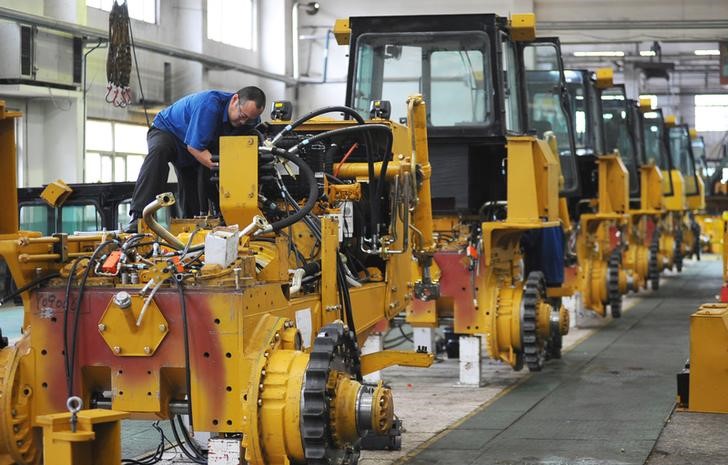BEIJING (Reuters) - China's manufacturing output rose at the weakest pace in fourth months in October and companies continued to shed staff despite a slight pick-up in domestic and export orders, a private survey showed on Wednesday.
Stringent winter air pollution curbs could add to business costs and force companies to throttle back production further in coming months, one analyst said.
The Caixin/Markit Manufacturing Purchasing Manager's Index (PMI) was 51.0 in October, unchanged from September’s reading and in line with economists' expectations for a further modest improvement in operating conditions.
But the production sub-index fell to 50.8 from 52.1, nearing the 50-point threshold that separates expansion from contraction on a monthly basis, while confidence in the outlook over the next year moderated to the second-lowest since August 2016.
The Caixin report followed a similar official survey on Tuesday which pointed to an unexpected cooldown in China's manufacturing sector in the face of a weakening property market and a crackdown on smog, which is forcing some steel mills and factories in the northeast to curtail or halt production.
The Caixin version, which tends to focus more on small and mid-sized companies, did show a modest expansion in domestic and export demand, however, while the official readings showed a marked softening in new business.
The private survey also suggested further pressure on profit margins for smaller companies, which have not benefited as much from a year-long construction boom as their larger, state-owned peers.
Input prices continued to rise at a sharp clip due to higher raw material costs and tougher environmental policies, but stiff competition limited firms' ability to fully pass on the cost increases to their customers.
The rate of input price inflation was among the highest since early 2011, though it did ease slightly from September.
"The stringent production curbs imposed by the government to reduce pollution and relatively low inventory levels have added to cost pressures on companies in midstream and downstream industries, which could have a negative impact on production in the coming months,” Zhengsheng Zhong, Director of Macroeconomic Analysis at CEBM Group, said in a note accompanying the Caixin release.
Small- and medium-sized manufacturers in China's industrial heartland are struggling with soaring costs or facing closure as
as a mandated switch from coal to cleaner-burning fuel pushes natural gas prices higher, according to a Reuters report citing industry executives.
China's economy has surprised global financial markets and investors with robust growth of nearly 6.9 percent so far this year, driven by a renaissance in long-ailing "smokestack" industries such as steel.
But property and construction activity, two of the economy's main growth drivers, are starting to cool under the weight of government measures to cool heated housing prices and higher borrowing costs.
